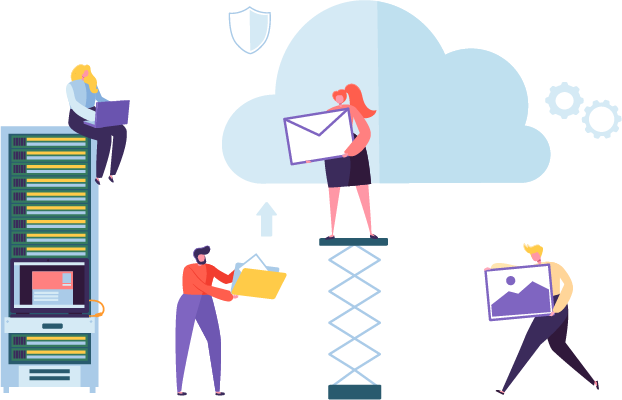When we think about the contact center, we imagine a room full of people with headphones on, talking to customers and resolving their queries. And that’s true. But after the technology is advancing and hitting new heights, everything is going digital. Every industry is noticing that and to beat the cut-throat competition and stay in alignment with the trends, they are investing more in going towards digital and cloud. Healthcare industry is one of them.
These days, hospitals, clinics, and diagnostic labs are not limited to generating bills and treating patients. The rising competition has broadened the scope of business and now they are focusing more on customer satisfaction and their feedback more than ever, just like other industries. To successfully do that, Healthcare Contact Center seems to be the important key.
An ideal healthcare contact center software should come with built-in capabilities for monitoring your customer service agents’ total performance in real-time — making sure that you are consistently providing excellent care for patients, and that you are fully empowered with the way that the customer is engaging with your organization. Many challenges are booking appointments, clearing insurance claims, efficiently handling urgent calls, sending reports in a timely manner, etc. All of these challenges can easily be solved with contact center solutions software.
Let’s understand what is a healthcare contact center solution and how this industry is benefiting from that? But before that, let’s have a quick look at the definition of cloud contact center solution.
What is a Cloud Contact Center Solution?
Cloud Contact Center is a call center hosted on the internet where all inbound and outbound communication with the customers whether through call, SMS, email, or social media, is handled online in one place. With the help of a cloud contact center solution, agents can connect with customers anytime anywhere in the world, and vice-versa. Due to this, doing business with international customers has become very easy.
Is contact centers useful in healthcare?
While healthcare organizations may handle cyber security internally, outsourcing data management and security to a cloud-based provider is the most pragmatic solution. With operational capacity, system resiliency, and cost pressures being consistent factors across the healthcare industry (especially government healthcare), it is evident that a healthcare contact center powered by a CCaaS can be the leader to deliver value for patients and providers via digitalization.
Benefit in Healthcare Industry because of Cloud Contact Center
- Patients want 24/7 customer care, prompt communication, comfortable services, etc.
- To ensure round-the-clock support and nurture patient relationships, your healthcare contact center solution must have the right technologies. The call center’s role in healthcare has always been critical, and will only grow as technology advances continue to offer multiple ways to serve customers better.
- Rather than being a wasteful but necessary expense, healthcare call centers have emerged as one of the best opportunities for increasing patient engagement and improving patient experiences. Healthcare companies should invest in cutting-edge, cloud-based call center technologies that enable company expansion, increase patient engagement, and manage surges in call volumes while providing seamless, satisfying patient service for the healthcare industry.
- Cloud-based call center services can minimize those costs and resource demands for medical practices, as providers take care of all these upgrades and software updates for you.
- If you are still wondering about customer expectations and what a call center solution should do, keep reading. With a wide range of benefits to patients, healthcare providers are sure to be better connected to them.
- These capabilities could help turn healthcare customer care into a multifaceted department, driving engagement and patient retention in the long run.
- The Omnichannel solution can be combined with other solutions to offer multiple channels of communication like phone, web chat, email, or other social media channels.
- An example showing how having a cloud contact center solution could revolutionize healthcare, making communications simpler and more effective. Having a Contact Center solution makes for an end-to-end communications platform in healthcare, which is advantageous to both hospitals and patients.
- Healthcare contact center has to be strictly abide by the rules of HIPPA wherein all the communication with the patients has to be secure whether via voice call, video call or text messages. HIPPA also ensures that all the documents of the patients are kept confidential by the healthcare facility.
- Cloud contact center solution is an omnichannel solution wherein you can connect with your customers through multiple channels like voice call, SMS, or social media. This brings convenience to not only your patients but also to your agents.
- Call routing brings another level of ease to the customers and agents as they can directly connect the customers to the desired department which saves a lot of time, increase in productivity, and brings job satisfaction.
- Healthcare providers can easily integrate their CRM software with the cloud contact center solution. SparkTG provides the integration facility with both in-house and third party brands like Zoho, Freshdesk, Kapture, Salesforce, etc. CRM integration helps the healthcare providers to view the patient’s history, reports, documents, and other information anywhere anytime.
You might also like to read Complete Guide to IVR Toll-Free Number
Conclusion
Cloud-based solutions can help mitigate significant challenges faced in healthcare, like the stifling and rigid software, which hampers growth. New call center software alone does not change a healthcare organization’s customer service operations. The ideal goal of a cloud-based call center is improved customer experiences, and healthcare workers need to recognize their patients and customers are the same. In that context, customers’ expectations are that they will be treated both as customers and patients, inappropriate moments.




